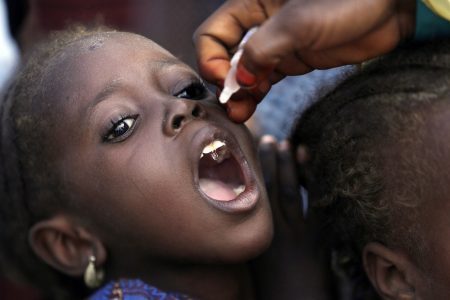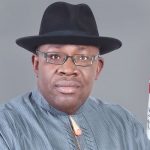THE Ekiti State Primary Healthcare Development Agency has announced that about 700,000 children are targeted for immunisation in the next round of National Immunisation plus Days (NIpDs) in the state.
The agency told newsmen at a media executives planning meeting that the resurgence of polio in the country had mapped out strategies to capture children aged five years and below in the 16 local government areas of the state.
The immunisation, according to the Director, Ekiti State Primary Health Care Development Agency, Dr Joshua Ileke, would be carried out on March 25 to 28, 2017 and will involve all the critical stakeholders, including traditional rulers, religious leaders and sundry stakeholders across the 177 wards in the state.
Dr Ileke, who addressed the media at the meeting held in Ado Ekiti, in preparation for the programme, lamented the re-listing of Nigeria as a polio nation by the World Health Organisation (WHO), describing the development as “worrisome and intolerable.”
He said Ekiti has a population of 3.3 million going by the 2003 census and that about 22% of this population are below age five, which he said this substantial population cannot be treated with disdain for Nigeria to maintain a healthy population.
“Nigeria was declared polio free in 2014 and this we maintained till 2016 before another outbreak was noticed in Borno State. We were expecting a polio-free certificate from WHO when this happened and Nigeria had to be relisted again as a nation where polio is endemic.
“We were able to maintain this for two years before this virus reared its ugly head last year September. Apart from the fact that this exercise will take place in all the 320 health facilities across Ekiti, we are also visiting all households, schools, churches, markets to ensure that no child is left unimmunized.
“Though, we have not recorded any case of polio victim in Ekiti for close to 20 years, but we have to prevent it, because only one percent of children that are attacked show paralysis with others serving as carriers who can spread it through sneezing, coughing and stooling to others.
“We are choosing children below age 5 as the target because they are the most vulnerable, though I am not saying other age groups can’t contact it, but it is more dangerous in children of that ages,” he said.
He called on traditional and religious leaders to sensitize their subjects, so that they can make their children available to health personnel for the success of the exercise.
Ileke particularly appealed to the leaders of Ebira and Hausa Communities, who are predominantly rural dwellers to observe the exercise to make Nigeria free of this killer disease.
“Some of our people used to hide their children due to religious inclinations, this is wrong and dangerous because children that are not well immunized could serve as carriers that can spread the virus to others. So, whoever does this is a potential danger to wherever he lives.”






